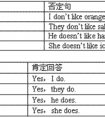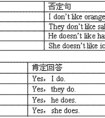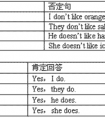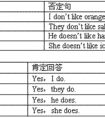将下列句子改成疑问句和否定句。Thereissomewaterinthebottle.__________________________-六年级英语
题文
| 将下列句子改成疑问句和否定句。 |
| There is some water in the bottle. __________________________ |
答案
| Is there any water in the bottle ? There isn't any water in the bottle. |
据专家权威分析,试题“将下列句子改成疑问句和否定句。Thereissomewaterinthebottle._..”主要考查你对 不定代词,否定句,一般疑问句 等考点的理解。关于这些考点的“档案”如下:
不定代词否定句一般疑问句
考点名称:不定代词
- 不定代词:
不指名代替任何特定名词或形容词的代词,来表示不确定的人、事物或数量。
主要有:all,each,every,both,either,neither,one,none,little,few,many,much,other,another, some,any,no 一般不定代词用法举例:
1.some 一些,某些,某个
不定代词some可以代替名词和形容词,常用在肯定句中作主语、宾语、定语等。作定语时,它可以修饰可数名词(单、复数皆可)和不可数名词。例如:
some are doctors,some are nurses.有些人是医生,有些人是护士。(作主语)
2.any一些,任何
不定代词any可以代替名词和形容词,常用在否定句或疑问句中作主语、宾语、定语等。作定语时,它可以修饰可数名词(多为复数)和不可数名词。例如:
there isn’t any ink in my pen.我的钢笔没有墨水。(作定语)
不定代词any有时也可以用在肯定句中,表示"任何的"。例如:
you may come at any time;i’ll be home the whole day.你任何时候来都行,我整天都将呆在家里 。
不定代词any也可以用作副词,做状语,表示程度。例如:
is he any better today?他今天好一点了吗?
3.all 全体,所有(指三者以上)
不定代词all在句中可以作主语、宾语、表语、定语或同位语。
它可以代表或修饰可数名词和不可数名词。
代表或修饰可数名词时,指两个以上的人或物。
作先行词时,引导词用that。例如:
all were present at the meeting.全都到会了。(作主语,代表可数名词)
4.both 全部,都
不定代词both指两个人或事物。和all一样,可以用作主语、宾语、定语或同位语。例如:
we invited both to come to our farm.我们邀请两个人都来我们的农场?(作宾语)
5.none 无人或无
不定代词none的含义和all物相反,和no one,not any同义,但其用法相当于名词,在句子中一般作主语或宾语。
它代替不可数名词作主语时,谓语动词用单数形式;代替可数名词作主语时,谓语动词用单、复数皆可。例如:
none of the problems is /are easy to solve.这些问题没有一个是容易解决的。(作主语, 代替可数名词)
6.either 两者之中的任何一个,这个或那个。
不定代词 either 可以作主语、宾语和定语。例如:
either of them will agree to this arrangent.他们两人中会有人同意这样的安排的。(作主语)
7.neither 两者都不
不定代词 neither 是 either 的否定形式,可以作主语、宾语和定语。例如:
neither is interesting.两个都没有趣。(作主语)
8.each 每个,各自的
不定代词each指每一个人或事物的个别情况,甚至指这些个别情况各不相同。
它在句中可以作主语、宾语、定语和同位语。例如:
she gave the children two apples each.她给了每个小孩两个苹果。(作the children的同位语。)
9.every 每个,每一的,一切的
不定代词every有"全体"的意思,和all的意义相近,但只能作定语。- some和any的用法比较:
some和any均可代替名词和形容词,作定语时,它所修饰的名词既可以是可数名词,也可以是不可数名词。
some一般用于肯定句或肯定形式的答语中,any一般用于否定句或疑问句中否定形式的答语中。
例:There are some birds in the tree. 树上有一些鸟。
There is some bread in the dish. 盘子里有一些面包。
— Do you have any story-books? 你有故事书吗?
— Yes, I have some. 是的,我有。
— No, I don’t have any. 不,我没有。
no 用在肯定句中表示否定的意思。
例:There are no letters for you today. 今天没有你的信。
考点名称:否定句
- 否定句:
表示否定的句子。必须有否定词。
否定句的构成形式:
a. 谓语为be动词时,“be+not "一名学生。
b. 谓语为实义动词而且没有情态动词和助动词时,“do/ does/ did+not"构成否定。
例:I do not like dancing. 我不喜欢跳舞。
He does not want to go to school. 他不想去上学。
c. 谓语为“情态动词+实义动词”时,“情态动词+not”构成否定。
例:You must not smoke. 你千万不要吸烟。
I can not catch it. 我抓不住它。 - 否定句在英语语法中可以分为九类:
(1)一般否定句
I don't know this. No news is good news.
There is no person(smoking)/not a person/not any person(smoking)in the house.
(2)特指否定
He went to his office, not to see him.
I am sorry for not coming on time.
I don't think/believe/suppose/feel/imagine you are right.
(3)部分否定
All the answers are not right
All is not gold that glitters
I don't know all of them.
I can't see everybody/everything.
Both of them are not right.
(4)全体否定
None of my friends smoke.
I can see nothing/nobody.
Neither of them is right.
Nothing can be so simple as this.
(5)延续否定
You didn't see him, neither/nor did I.
You don't know, I don't know either.
He doesn't know English, let alone/to say nothing of/not to speak of(更不用说)French.
(6)半否定句
We seldom/hardly/scarcely/barely hear such fine singing.
I know little English. I saw few people.
(7)双重否定
You can't make something out of nothing.
What's done cannot be undone.
There is no sweet without sweat.
No gain without pains.
I can't help /keep/ laughing whenever I hear it.
No man is so old but(that)he can learn.
(8)排除否定
Everyone is ready except you.
He did nothing but play.
But for your help, I couldn't do it.
(9)加强否定
I won't do it at all.
I can't see it any more.
He is no longer a boy. 否定转移的形式与用法:
一、动词的否定转移
1.形式上否定主句的谓语,实际上是否定从句的谓语
当动词“think”、“believe”、“suppose”、“imagine”、“expect”、“feel”的主语是第一人称,谓语动词为没有任何副词修饰的一般现在时,它们的否定式实际上是对宾语从句的否定。
表示说话者提出一种委婉的看法或主张。如:
I think that he will help us.——I don’t think that he will help us. 我认为它不会帮助我们。
I believe that he is right.——I don’t believe that he is right. 我认为他不对。
I suppose that he likes it.——I don’t suppose that he likes it. 我想他不喜欢它。
- 最新内容
- 相关内容
- 网友推荐
- 图文推荐
| [家长教育] 孩子为什么会和父母感情疏离? (2019-07-14) |
| [教师分享] 给远方姐姐的一封信 (2018-11-07) |
| [教师分享] 伸缩门 (2018-11-07) |
| [教师分享] 回家乡 (2018-11-07) |
| [教师分享] 是风味也是人间 (2018-11-07) |
| [教师分享] 一句格言的启示 (2018-11-07) |
| [教师分享] 无规矩不成方圆 (2018-11-07) |
| [教师分享] 第十届全国教育名家论坛有感(二) (2018-11-07) |
| [教师分享] 贪玩的小狗 (2018-11-07) |
| [教师分享] 未命名文章 (2018-11-07) |






